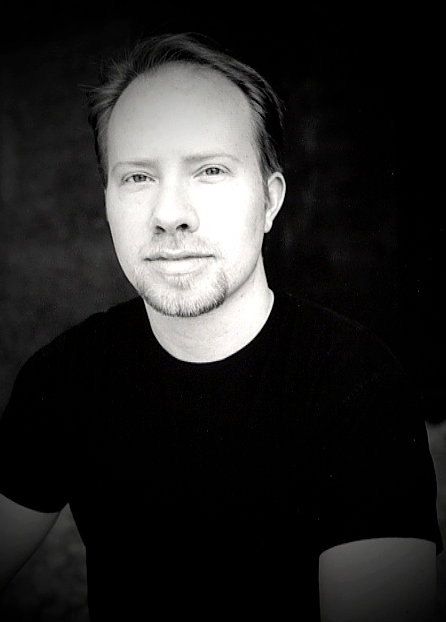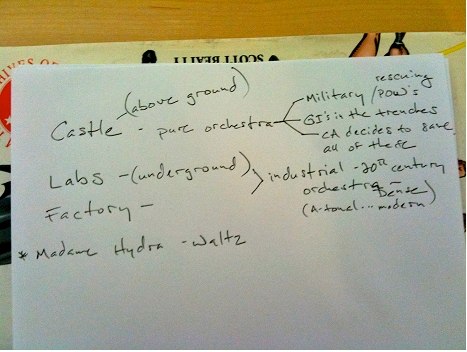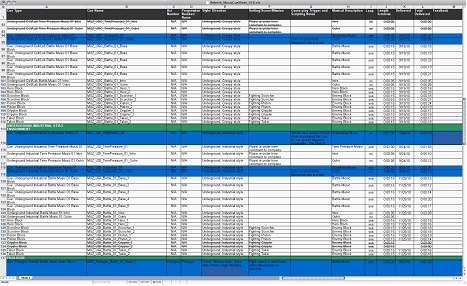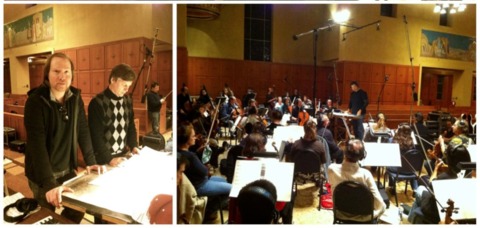Sound Byte: Meet the Composer of Captain America - Bill Brown
Come listen to some music from Super Soldier and read what composer Bill Brown has to say about video game music.
 Many composers get their feet wet with film and television before exploring the world of video game music, but Bill Brown's career began with a few games you might have heard of, such as Rainbow Six and Ghost Recon. His latest video game project is Captain America: Super Soldier, which comes out July 19. Spread out in the interview below are a few music samples from the game, so have a listen and let us know what you think! Also, be sure to follow us on Twitter @gs_soundbyte for a chance to win a copy of the game on the Xbox 360, PlayStation 3, Nintendo Wii, and Nintendo DS! For more music from Captain America and other video game tunes, be sure to listen to Sound Byte Radio.
Many composers get their feet wet with film and television before exploring the world of video game music, but Bill Brown's career began with a few games you might have heard of, such as Rainbow Six and Ghost Recon. His latest video game project is Captain America: Super Soldier, which comes out July 19. Spread out in the interview below are a few music samples from the game, so have a listen and let us know what you think! Also, be sure to follow us on Twitter @gs_soundbyte for a chance to win a copy of the game on the Xbox 360, PlayStation 3, Nintendo Wii, and Nintendo DS! For more music from Captain America and other video game tunes, be sure to listen to Sound Byte Radio.
GameSpot: What is your musical background?
Bill Brown: I wrote a lot of music growing up, through high school, and then went to Berklee College of Music in Boston and graduated with a degree in film scoring. The Berklee education was key because (1) I made friends who helped me in my career later and (2) It gave me a starter set of tools I needed to meet the opportunities I've been given. Since then, my education has been my own. I strive to continue to stretch and learn and grow with every cue I write. I noticed that after doing that for 15 years, I've gotten better at what I do.
GS: What was the first instrument that you picked up?
BB: Piano.
GS: Is there an instrument you wish you knew how to play?
BB: I'd like to spend more time playing classical and jazz guitar, actually; but I'm constantly writing using the piano instead. GuitarViol is something I'm focusing on recently as well. It's more complex trying to use the bow and play guitar chords at the same time. It's great to pick up new instruments because your fingers can't go where they are used to going all the time. Good for finding fresh sounds and melodic ideas.

GS: What is your fondest memory when it comes to music?
BB: Listening to Jerry Goldsmith's music in the theater years ago. I remember watching The River Wild and just being in this euphoria about how incredible the score sounded in the theatre at the time. I fell in love with the orchestra because of those incredible composers and the wonderful musicians that performed those scores. Those performances have a soul of their own. The way John Williams, John Barry, JNH, or Tom Newman, etc., etc., shape their music on the stage. They and so many other composers have brought me such a depth of joy that it's difficult to even understand completely myself. I think that's why I go into the studio every day and keep striving and pushing myself. So I can be closer to that experience of film music I fell in love with all those years ago. Sometimes I'm able to rekindle that excitement…quite often actually. And that is a huge gift.
GS: How did you get into making music for video games?
BB: After graduating with a degree in film scoring from Berklee College of Music in 1991, I interned for a couple years in New York, worked in a music store in New Jersey, and then finally moved to Los Angeles in 1994 after being offered a job as a sound editor. After two years, a friend introduced me to Scott Gershin over at Soundelux. Scott was just creating a music division there and hired me to help. Early on, while we were still in temporary offices there, I did a demo for a DreamWorks Interactive PC game called Trespasser: The Lost World and then another demo for a new game called Tom Clancy's Rainbow Six. Both demos were hits with the developers, and I was on my way. I was in the right place at the right time with those projects. I worked really hard for years on a lot of AAA titles and had a lot of fun creating all of that music. I had no idea I'd be writing music for games before I wrote those first demos! And luckily for me, the different groups at Soundelux were working on feature films and commercials as well, which helped open doors for me into scoring for television. Now, I'm working on more films and looking forward to bigger and better opportunities with every project I'm fortunate enough to work on, including writing more music for games.
GS: How is composing for games different from composing for film or television? What do you like or dislike?
BB: The important thing to remember with scoring games is that players are steering it, and they might live with the score for longer periods of time as compared to film or television, so you have to create the score accordingly. Sometimes it's reactive down to the most minute detail, and sometimes you are covering a wide range of events with one piece. That makes it an interesting challenge musically. I've always believed the music has to have a soul regardless. It needs to be connected thematically/texturally, and then it needs to support the action in whatever shape it takes.
GS: What is your process when composing a particular track for a game? What do you have access to in terms of materials to go off of?
BB: It's all about collaboration. And sometimes, that collaboration is as simple as, "Hey Bill, check out this movie (or art, game alpha, etc.)…do your thing, man…we have about five weeks." And then, together we'll agree on a direction musically speaking that fits. I'm grateful that I have already established trust in so many of my director/producer relationships at this point in my career. That trust is really key in bringing myself creatively to the project.
GS: Tell us about the music of Captain America: Super Soldier. What kind of research went into coming up with the right tone and mood for the game and what was your process in creating it?
BB: We started this project over a year ago in May of 2010. Next Level Games (the developer) sent me some preliminary artwork back in 2009--storyboards and that sort of thing--and I started thinking about the palette and tone of the score. They had temped the first demo levels with my score from Wolfenstein (2008), as there were similarities in the location and WW2 era, and it was working well, but it was missing that aspect of the score that needed to support Captain America. I also wanted to bring more of a thematic/motif-based structure to this game where Wolfenstein was more of an atmospheric score.
In June of 2010, I traveled from Los Angeles to Vancouver, Canada, (a really beautiful city by the way) and had the pleasure of meeting the entire staff at Next Level Games. That trip reminded me…actually this whole project reminded me how much fun games can be to work on. I could go on for an hour about how great the people at Next Level are, but let me just say I consider them great friends and am so grateful for how welcoming and enthusiastic they were about the music through the entire process. We had a lot of fun with this project. During that visit, the team took me through the game and their creative vision of it. As they described the levels and the narrative and showed the flow of the game with visuals, I started to come up with some completely new thoughts and ideas for the score right on the spot. I had this idea about how the orchestration would mirror the player's perspective in the game. Where the player is first introduced to a recognizable old castle environment, the orchestration would be more pure, and as the out-of-place futuristic and organic odd science is slowly revealed, the orchestration would become more dissonant and experimental, and more synthetic/ambient textures and percussion would be introduced.
I wrote notes during the meeting and took a photo of them as I was writing them…
(Just as a side note, I had this idea that the character Madame Hydra might be represented with a dark, 20th century influenced waltz. As it turned out, that idea influenced the entire score as I ended up writing many of the cues in 3/4, 6/8, and so on, including the initial cue I composed "Above Ground Battle.") This was just the beginning. The next idea that came up for me after we agreed on this general orchestration direction was the larger idea of splitting the score into blocks of motivic/thematic material. The idea was that for action cues (which comprise over one-third of the score), I would create individual motifs for all of the characters, and as the characters were spawned into the environment, their motif would begin to show up in the score reactively. I'm sure this isn't a new concept, but I hadn't really gone into this level of detail with a game project up to this point, and I knew it was going to be a lot to keep track of, but it was so exciting…this idea of the counterpoint of characters going back and forth reactively to the gameplay was too exciting to pass up!
I led the team in designing a music cue sheet that would help us structure and keep track of the score as it was created. It was a monster of an asset list dozens of pages long but was very helpful in moving from project start to completion (see image example).
The next step of the process was to come back to my studio in Los Angeles and actually write the themes for all of these characters. I started with a cue called "Above Ground Battle" or MUZ_AGM_Battle_01 in the cue sheet (you can listen to this cue below). We actually didn't end up recording this cue with orchestra, as my mock-up sounded pretty cool. But the orchestra really served us well on the rest of the score!! (As you'll hear in the other cues included here!) In this approximately 3:47 minute cue, I created five unique character signatures or themes over a continuing rhythmic ostinato. Those five themes became the skeleton for the rest of the score essentially. Everything from that point was influenced and built from those themes. The last part of the creative discovery for the score was finding [that] we needed exploratory cues (that would be blocked out and triggered by the environment itself), time-pressure cues to pump adrenaline into situations in the game, and of course action cues that would be blocked out and triggered reactive to the characters involved in specific fight scenarios. During the process of writing the score, my friend and longtime collaborator Maarten Spruijt assisted me in creating additional signature variations/orchestrations along with bringing his vast expertise in orchestra sampling and programming to the project. I feel so blessed to have had such a fantastic and supportive team throughout the entire process.
In the cue "Zola Meet Cap," about halfway through after the introduction of Zola's theme, you'll hear one of the main themes I wrote for Captain America. You'll hear variations of another Captain America theme I composed in "Above Ground Battle" in the cue "Scorcher" along with signatures for the Scorcher character and some other motifs that relate to characters that Cap encounters throughout the game. Then, you'll hear variations of the Cap theme again in "Iron Cross Battle," along with the other signatures and themes. I composed all of these cues as separate signatures for the characters that show up in a particular sequence and then split them out so they are triggered whenever the character shows up in the game. So you'll hear my theme for Cap, and then Iron Cross theme, and then Cap again, etc.
We recorded the score with live orchestra in Seattle in October of 2010 (see photos), and my friend Alex MacFarlane (the audio director at Next Level Games) did a fantastic job mixing the score in 5.1 for the game right after the scoring sessions. My deepest thanks and appreciation goes out to Brandon Gill and the entire staff at Next Level Games, SEGA, and everyone at Marvel for a wonderful experience!
GS: Is the approach to Captain America different than say, a project like Ghost Recon?
BB: With Ghost Recon, I created an overall main theme that supported the emotion of the missions and the narrative in general, and the rest of that score maintained the feel of that theme but not as much the development and variation of it as with the Captain America: Super Soldier score. Ghost Recon was similar to Captain America in that I also created exploratory cues and action cues to help drive the gameplay. Something different about the Tom Clancy games is that we created "man down" cues for those parts of the missions that didn't go so well, which we didn't do for Captain America.
GS: Do you have a favorite genre of video game?
BB: Not really… the better the narrative, the characters, and the storyline, the better for me.
GS: Where do you see video game music heading into the future?
BB: It seems to be really going in a good direction creatively. During the past 10 years, I've seen and heard some really amazing work, and the industry continues to thrive. The one problem I have with game music is that there are no residuals for reuse or performance royalties…like on big MMORPGs that are using the music 24/7 online. I feel it is unfair to continue reusing music in new products without compensation for the creator of that music.
GS: What kind of music do you listen to now? What are your biggest influences?
BB: I listen to a little of everything, but I really enjoy listening to all kinds of film music. Bernard Hermann, Tom Newman, John Williams, Alan Silvestri, Jerry Goldsmith, James Newton-Howard, and Howard Shore are some of my favorites. Minimalists like Berg and John Adams, as well as impressionistic composers like Ravel and Debussy, also have inspired my process. Some of my favorite "classical" concert composers include R. Vaughn Williams, Paul Hindemith, Stravinski, and Roy Harris. I was blown away by David Arnold back in the day when he came out of nowhere with his score for Stargate and then kept creating those big thematic scores one after the other. I was lucky to be there at the BMI Awards this year when he accepted the Captain Kirk award. That's an inside joke…sorry. [laughs]
GS: What projects are you currently working on that you can talk about?
BB: I just finished a film that was titled Fishers of Men for a while and has been retitled Brother's Keeper, which will probably be coming out next April. I'm hoping to release the score CD well before that if possible though. Next up is an independent film called Duke starring my friend Carmine Giovinazzo (he plays Danny on CSI: NY), which has a great cast and script. I'm waiting to see the first cut next week actually. And then CSI: NY season 8 kicks in just a few weeks after that! I didn't take a break this year…
GS: Any advice for aspiring musicians?
BB: I would just say don't try to be someone else…just be yourself. Stay true to what it is that really moves you. Know you're going to have to work really, really hard. I mean really super crazy hard. Stay humble, put your ego away, and just try to have fun with it. Listen, learn, and innovate…and then do that again. But most of all, just have fun with it and then let go and open yourself to collaboration. Be like water…just flow with it all.
GS: Thanks for your time!
Sound Byte is GameSpot's game music blog, which covers every aspect of music and audio in games, including interviews with top game music composers and sound designers, as well as discussions of new or classic game soundtracks. Have a question or suggestion? Leave us a comment below or e-mail us at soundbyte@gamespot.com. For a list of previous Sound Byte features, click here. Follow us on Twitter! @gs_soundbyte
Got a news tip or want to contact us directly? Email news@gamespot.com



Join the conversation